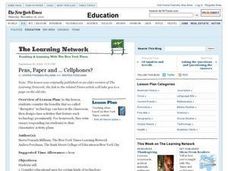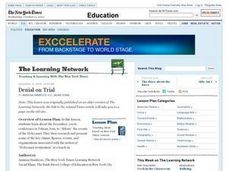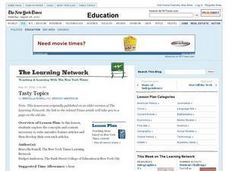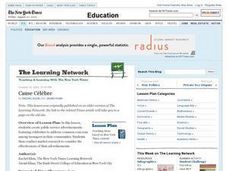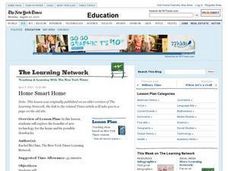Curated OER
Black Power
Use this New York Times activity to research contemporary leaders in the African-American community. After reading the article "Blacks Weigh the Impact of the Post-Jackson Years," middle and high schoolers discuss the varying viewpoints...
Curated OER
Pens, Paper and ... Cellphones?
Students consider the benefits that so-called disruptive technology can have in the classroom, then design class activities that feature such technology prominently. They write essays responding (as students) to their classmates'...
Curated OER
"Golden" Years?
The Golden Years? Upper graders may think retirement is a long way off, but in life everything is just around the corner. They consider what it means to retire and the current trend of parents working for their Students. They research...
Curated OER
Following the Leaders
Examine the historic election of Pope Benedict XVI and reflect on the challenges he faces as the new leader of the Catholic Church. This New York Times lesson investigates how other world leaders are chosen in different forms of...
Curated OER
College or Bust?
Based on a New York Times article, "The College Drop-Out Boom," participants in a fishbowl discussion formulate and express opinions about the correlation between level of education, career options, and economic mobility. Ample...
Curated OER
The Learning Network: Re-envisioning Classic Stories
Readers reflect on enjoyable stories they know, brainstorm criteria that make a story "good," analyze a New York Times article about innovative children's performances, re-envision classics on their own, and peer edit drafts. Use this as...
Curated OER
A New Era for Palestinians
Get a global perspective and examine the challenges facing Mahmoud Abbas, the newly elected president of the Palestinian Authority. Thoughtful classroom citizens write letters to Mr. Abbas, asking him questions and suggesting advice....
Curated OER
Is That a Fact?
Investigate popular scientific claims and gather evidence to defend or argue against an author's stance. Writers synthesize information and compose their own "Really?" columns modeled after those found in the weekly "Science Times"...
Curated OER
Right to Remain Silent(?)
Learners consider the rights of journalists regarding source confidentiality, then create presentations on the New York Times' use of sources. They write guidelines to aid journalists in evaluating the trustworthiness of their sources.
Curated OER
Rave Reviews
A fun instructional activity that utilizes toys and persuasion! After reading the article, which was written in 2005, pull some advertisements for toys currently being sold. These will be more relevant to your middle and high schoolers....
Curated OER
Active Reading with American History
Explore connections within and between informational texts with this lesson about encyclopedia articles. Middle schoolers write encyclopedia articles focusing on topics in American history. They discuss how to determine credibility...
Curated OER
The Many "I's" In "Team"
Pupils examine the negative behavior of an Olympic athlete. They look at how his choices affected the team as well as his position on the team. They consider the many reasons why unity is important among the members of an organization...
Curated OER
Creating a Life Map
Learners create their own life map in which they introduce themselves to each other by sharing what they are most proud of. They use a life map to expressive themselves creatively.
Curated OER
May The Best Character Win
Students examine the financial committment to running a campaign. They discuss the difference between electroal and popular votes. They realize how involved a political campaign is!
Curated OER
Denial on Trial
What is the "Faurisson Affair”? What is “Holocaust Revisionism”? What does freedom of speech entail? Do revisionists have a right to voice their ideas? Such questions are at the heart of a richly detailed, thought provoking lesson...
Curated OER
Arti-Factual Evidence
Practice responding to controversial information with the New York Times lesson provided here. Middle schoolers watch a video interview with the director of The Lost Tomb of Jesus. After reading a companion article, they identify the...
Curated OER
Hey, Teacher, Leave My Kids Alone
What are the differences between homeschooling, traditional schooling, and unschooling? Middle and high schoolers examine the opinions of their peers on these varied types of education. After reading a New York Times article, they...
Curated OER
Tasty Topics
Students analyze a graphic from an article and predict what the article might be about. After reading an article, they discover a journalist's experience of traveling across the United States to compare fast food restaurants. They...
Curated OER
Truth Be Told
Encourage your middle and high schoolers to share their memories of a recent event. After reading a New York Times article, they discuss Elie Wiesel's memoir, Night. They write their own memoir about a significant event that affected...
Curated OER
Pay to Play?
Lead your class in a discussion about how they believe money influences politics. After reading "Go Ahead, Try to Stop K Street" from the New York Times, they evaluate the claims in the article about the current lobbyist scandal in...
Curated OER
What a Relief!
How are disasters addressed by the Federal Government? This New York Times lesson, based on the article "Disaster Aid: The Mix of Mercy and Politics," prompts middle schoolers to discuss the idea of using a disaster declaration as a...
Curated OER
Media Babies
What is a media baby? Discuss at what age children should be exposed to electronic media. After reading an article, they identify the types of media products for infants and toddlers. Learners will predict the effects of media on the...
Curated OER
Cause Célèbre
In this exercise, learners identify characters from an "Archie" comic and discuss the relevance of "Archie" to today's youth. They create public service advertisements featuring celebrities to address common concerns among teenagers in...
Curated OER
Home Smart Home
How smart is your home? Middle and high schoolers write a journal entry describing the types of technology found in their homes. After reading an article, they are introduced to "smart" home technology. In groups, they identify and...



